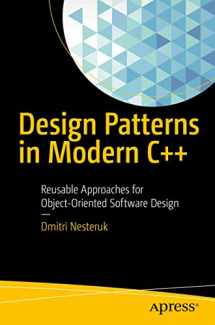
Design Patterns in Modern C++: Reusable Approaches for Object-Oriented Software Design
Book details
Summary
Description
Apply modern C++17 to the implementations of classic design patterns. As well as covering traditional design patterns, this book fleshes out new patterns and approaches that will be useful to C++ developers. The author presents concepts as a fun investigation of how problems can be solved in different ways, along the way using varying degrees of technical sophistication and explaining different sorts of trade-offs.
Design Patterns in Modern C++ also provides a technology demo for modern C++, showcasing how some of its latest features (e.g., coroutines) make difficult problems a lot easier to solve. The examples in this book are all suitable for putting into production, with only a few simplifications made in order to aid readability.
What You Will Learn
- Apply design patterns to modern C++ programming
- Use creational patterns of builder, factories, prototype and singleton
- Implement structural patterns such as adapter, bridge, decorator, facade and more
- Work with the behavioral patterns such as chain of responsibility, command, iterator, mediator and more
- Apply functional design patterns such as Monad and more
Those with at least some prior programming experience, especially in C++.


We would LOVE it if you could help us and other readers by reviewing the book
Book review



